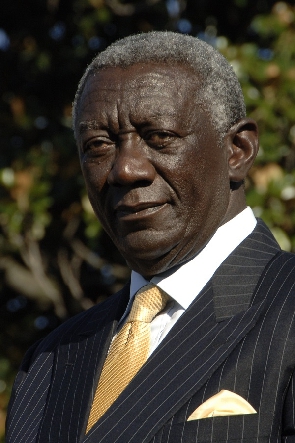This article was inspired by a conversation on ‘Pure Morning Drive’ on Pure 95.7FM in Kumasi on the day commemorating the birth of former President of Ghana, His Excellency, John Agyekum Kufuor, precisely on the 8th of December, 2022, hosted by Kwame Adinkrah.
In the studio were Dr. Kwasi Amakye Boateng (Lecturer, Political Science Dept., KNUST), Alhaji Ishaq Kyei Brobbey (Senior Lecturer, KsTU), and Dr. Stephen Banahene (Vice President, CSUC).
The conversation was mostly on President Kufuor’s distinctive skills, his role in consolidating the 1992 constitution, Ghana’s democracy, and his political party, the NPP.
Dr. Amakye was of the view that, as a senior political science lecturer, there is seemingly scanty or no literature on the role President Kufuor played in consolidating Ghana’s fourth republic and validating the legitimacy of President Rawlings’ regime.
He contended that the unexpected presence of a losing candidate, Kufuor, at President Rawlings’ swearing-in ceremony in 1997 at the Independence Square, the historic handshake and hug of the two personalities at the ceremony, and Kufuor’s congratulatory message all pointed to the free, fair, and transparent disposition of Ghana’s democracy and electoral system.
In his book, “The Children of House No. D13 South Suntresu, Kumasi,” Mr. Kwesi Ahwoi, a former Ghana High Commissioner to South Africa, said he proudly “engineered” the historic handshake between former Presidents John Agyekum Kufuor and Jerry John Rawlings, on January 7, 1997.
Fourth Republic
Political tensions rose after the PNDC abandoned its military roots in 1992, formed a political party with the name National Democratic Congress (NDC), and nominated Rawlings for president. According to Kwame Boafo-Arthur (2008), key political operatives, both military and civilian, during the reign of the PNDC were the same people that manned the NDC political juggernaut.
The NPP, led by Professor Adu Boahen, lost the presidential election, produced a report titled “The Stolen Verdict: Ghana’s November 1992 Presidential Election,” and regrettably boycotted the parliamentary elections.
The 1992 elections were relatively free and fair, and according to Boafo-Arthur, the flaws that came to light during the 1992 elections served as a basis for reforms to be made to the electoral process to reduce acrimony, enhance the legitimacy of the elected government, improve transparency and accountability, and strengthen democratic structures.
Kufuor accepted the results of the election, but he said that even though it was free, it was not fair.
2000 Elections
Thus, throughout the years leading up to the elections in 2000, there was a certain level of apprehension as to whether or not President Rawlings would honor the constitutional provisions regarding the completion of his two terms as a civilian Head of State.
This apprehension stemmed from the fact that President Rawlings had already served two terms. And throughout these years, according to Eunice Attakora-Manu, former senior reporter of the Pioneer and Chief Producer of ‘Pure Morning Drive, who was a key reporter to the Kufuor campaign, Kufuor made a conscious effort not to denigrate Rawlings and continuously assured the people that he would protect Rawlings and the country’s fragile democracy.
Because of these assurances and the wise move, the political tension in the country decreased even more.
The defeat of the NDC in the 2000 general elections was a landmark in Ghana’s political history. It further legitimized her democracy and maintained some relative stability.
Alhaji Ishaq Brobbey, senior lecturer at the Kumasi Technical University (KsTU), in eulogizing the former President Kufuor, applauded him for the inclusion of members perceived not to have fully supported his bid and belonging to a faction within his party.
The New Patriotic Party derives its inspiration from the Danquah-Dombo-Busia tradition, arguably, the oldest surviving political tradition in Ghana that dates as far back as 1947, before Ghana attained independence. The main political figures from whom this tradition stems are Dr. JB Danquah (founder of the United Gold Coast Convention (UGCC)), Dr. Kofi Abrefa Busia, and Simon Diedong Dombo.
It is, also, a general observation that President Kufuor emanates from the Busia faction, and therefore, to have included hard proponents of the Danquah and Dombo factions in his government further consolidated cohesion and good governance. Several years after his presidency, President Kufuor remarked that ‘Peace is possible if we are willing to move beyond our differences and if we can inspire a new form of responsible leadership.’
The innate character of tolerance of President Kufuor has been demonstrated throughout his life, as suggested by the senior lecturer.
One remarkable attribute of President Kufuor that was expressed by all the panelists, especially Dr. Stephen Banahene (a lecturer at the Christian Service University College-CSUC), is Kufuor’s firmness and decisiveness. If you recall, President Kufuor said his own cabinet disowned him for his decision to declare Ghana a HIPC nation, but he was resolute in his conviction.
To buttress his tenacity, he sacked his former Sports Minister, Mallam Issah, and accepted the resignation of Hon. Dr. Richard Anane’s, former Minister of Transport, who was indicted by the Commission of HumanRights and Administrative Justice (CHRAJ) and, moreover, sacked seven (7) ministers in his cabinet, including the current president Nana Akuffo Addo and his brother Dr. Addo Kufour from his government.
It is therefore, not surprising his clear advice to President Akuffo-Addo not to hesitate to sack any non-performing minister in his government.
Happy birthday, H.E. John Kofi Agyekum Kufuor, President of Ghana (2001–2009), Global Ambassador against Hunger, and Senior Grand Warden of the United Grand Lodge of England.
Belated Happy Birthday!
Opinions of Friday, 9 December 2022
Columnist: Kwame Adinkrah



















